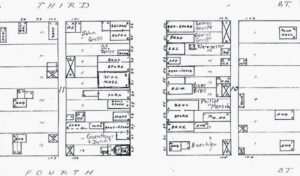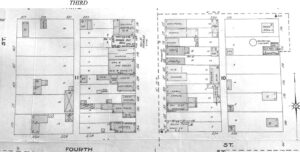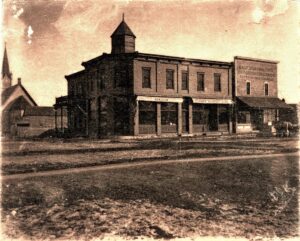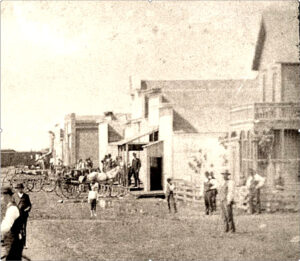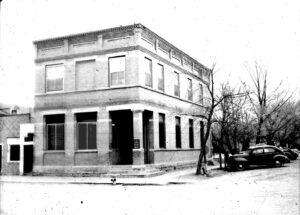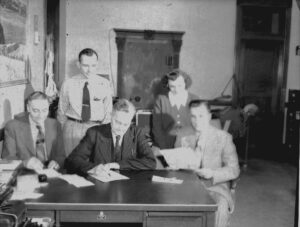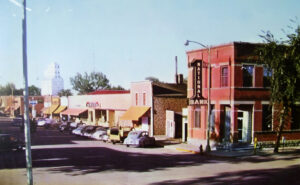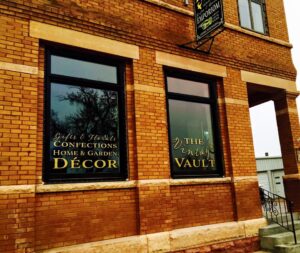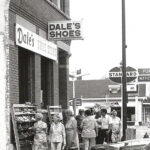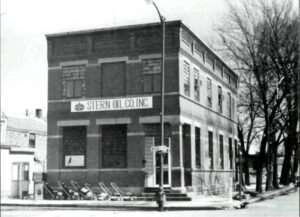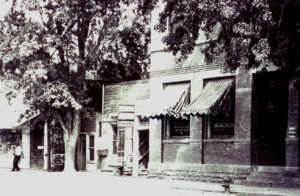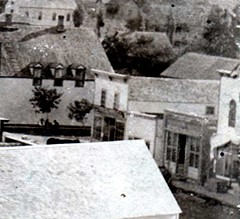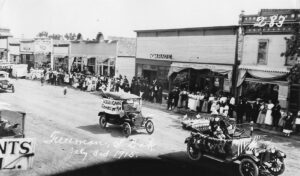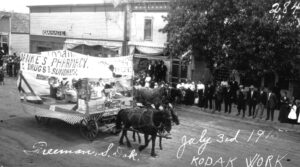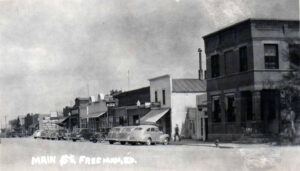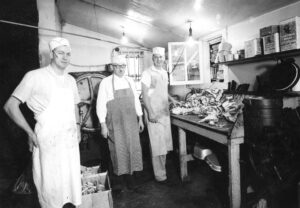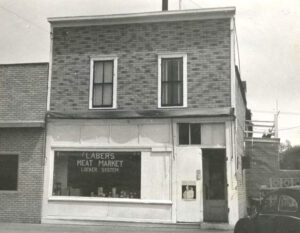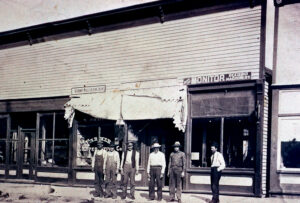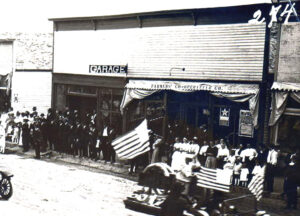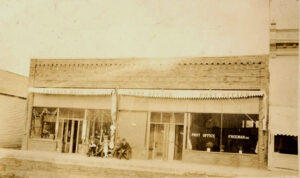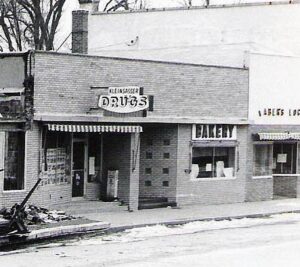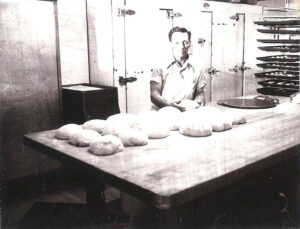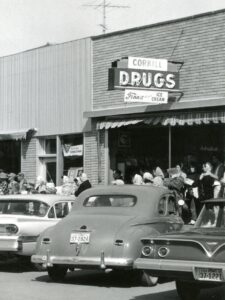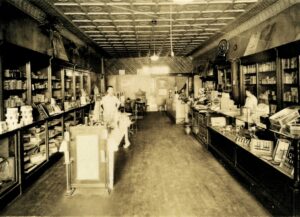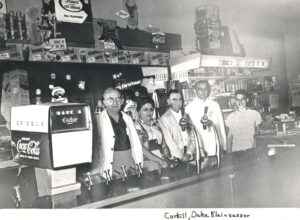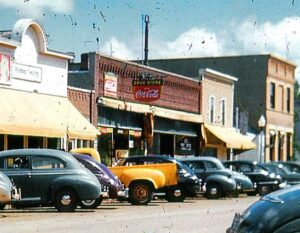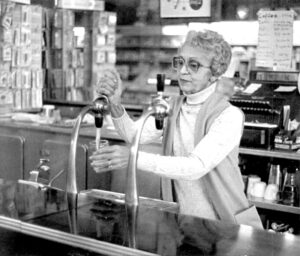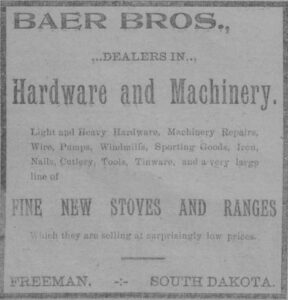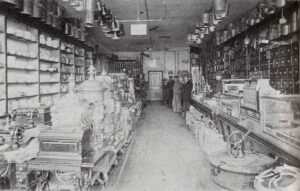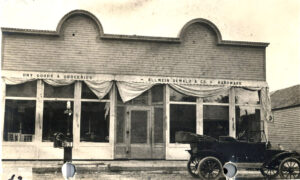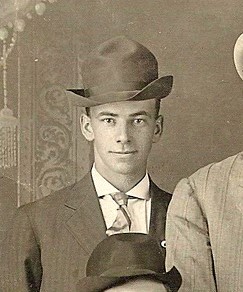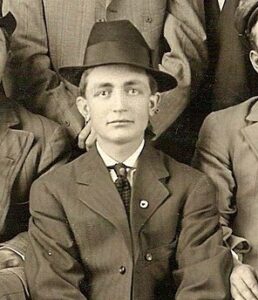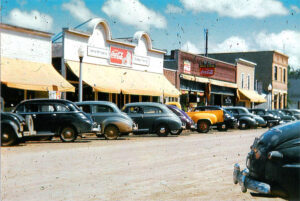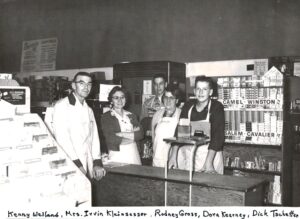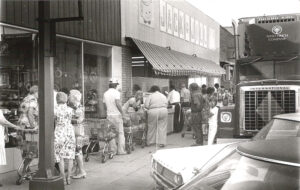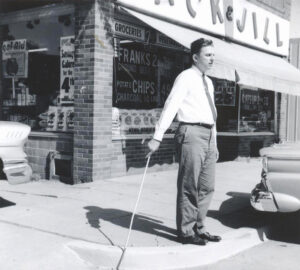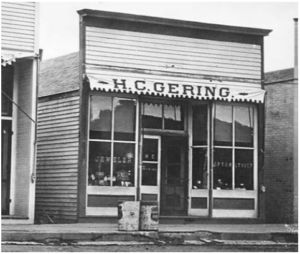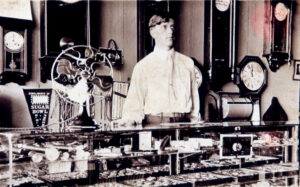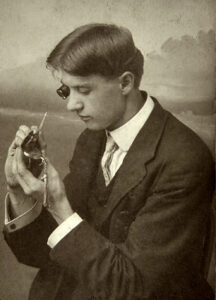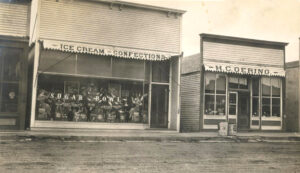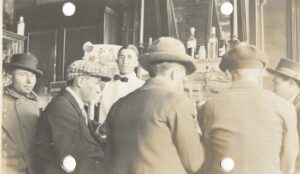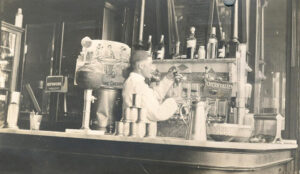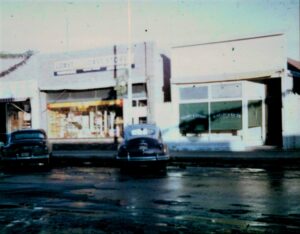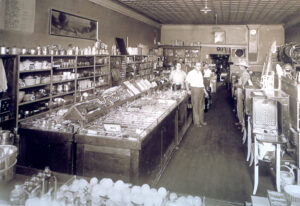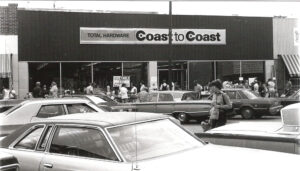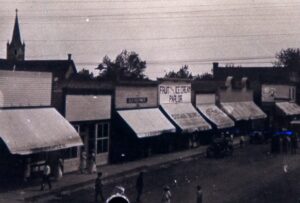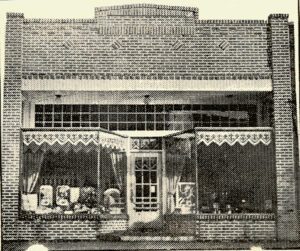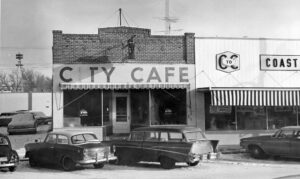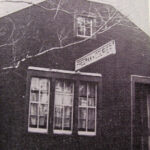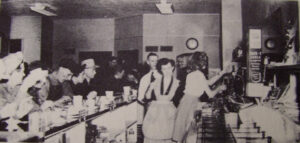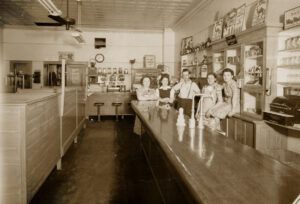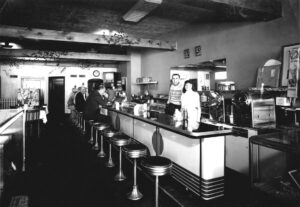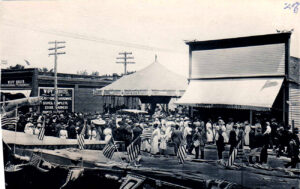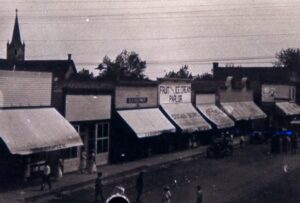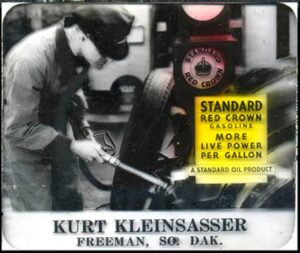First National Bank
In 1902 First National Bank was established in the Kaufman Jewelry store (Lot 17 on the south side of Fourth Street) where it operated until 1907. It was organized by John J. Waltner along with Joseph P. Graber, Joseph J. Waltner, Benjamin J. Waltner, and Jacob J. Waltner).
In 1906 a two story brick structure was built by Boyer and Boyer construction on the corner of Fourth and Main Street (Lot 7). (Chrisitan Buechler’s house had to be moved from the site to Poplar Street). In 1907 the bank began operation, run by J.J. Waltner for 56 years. In 1929 Dr. Isaac, Dr. Walter, and Dr. Benesh operated above the bank. This building has housed an attorney, dentist, doctor, beauty shop, and livestock dealer as well as running bank operation. In 1976 First National Bank moved a block east and constructed a new building.
Dale’s Shoes started above First National Bank in 1976. Dale Goertz operated the business adult and childrens shoes; casual, work, dress, western boots, and snow boots.
Gering Shoe Store
In 1885 Christian Buechler established Freeman Bank on Main Street (Lot 8). In the early 1900’s the bank closed and the building housed a liquor and cream store. In 1909 Andrew Gering started his shoe store in the small building and in 1929 his son Charles took over. Charles repaired shoes for several years in the small building on the north side of First National Bank. The business later moved to the south end of Main Street.
Tschetter Meat Market > Morfeld Meat > Laber Locker
In the 1880’s Guenthner and Haar opened a meat market on Main Street (Lot 9).
In 1900, when the brick Schamber Store was built down the street (the old Buechler building) was moved here. Philipp Mensch ran the meat business until 1913 when he sold it to Jacob Tschetter. Jacob operated Tschetter Meat Market until 1930. In 1934 L.W. Morfeld and Henry Bierman bought the business and opened Morfeld Meat Market. In 1938 L.W. Morfeld became sole owner and a locker system was added, with more additions in 1940 & 1944. In 1964 the building was remodeled with a new brick front. Leo Laber became manager in 1948 and bought the market in 1974 (Laber’s Meat Market).
Farmer's Coop > Freeman Bakery
In 1909 a group of farmers started Farmer’s Implement which became Farmer’s Co-Operative Implement Company in 1911. Jona Gering ran the Farmers Cooperative Company on Main Street (Lot 10) in the south side of the building until 1914, when the business moved across the street.
In 1916 the Freeman Post Office moved into the south side of the building. From 1924 to 1936 Francis Smidt was the postmaster.
In 1955 Vern Mettler opened Mettler Bakery on Main Street (now Strasser Law Office.) In 1965 Vern sold the business to Delmer Titze. In 1973 Delmer sold the business to Merrill Olson, who started Olie’s Bakery. In 1998 the Freeman Bakery became the Cookie Cutter, operating until 2000.
Central Drug > Kleinsasser Drug
In 1928 Duane A. Corkill bought the north part of the building (Lot 11) from Otto Temple and started Corkill’s Pharmacy (Central Drug). The business operated from 1928 to 1962. In 1948 Alfred “Duke” Kleinsasser joined the business and bought the store in 1962 starting Kleinsasser Drug. The building was remodeled in 1977 and Duke was in operation until 1984 when he sold the store. Kleinsasser Drug was open every day for 22 years.
Baer Bros > Ellwein Dewald > Jack & Jill
In 1890 Paul and Andrew Kleinsasser opened a hardware store on Main Street (Lot 12 & 13). The store was later sold to the Baer Bros; John, Christ, and Reinhold in 1897. The brothers operated the hardware store from the 1897 to 1913.
Jacob Ellwein, David Ellwein, and Edward Ellwein bought the Baer Brothers store in 1913. In 1914 Edward Ellwein and Gideon Dewald (Ellwein Dewald & Co) took over the Baer Bros store and remodeled. They operated a dry goods and grocery business. They also sold stoves and furnaces in the hardware store. The Ellwein store was open until 1956.
In 1951 Kenneth and Ione Weiland bought the Red & White store from Anthony and Margaret Miller (Kaufman Optometric site). In 1956 the name was changed to Jack & Jill. In 1964 Weilands bought the Ellwein store and moved Jack & Jill across the street. In 1979 Jack & Jill was sold to Clinton Schultz and became Jerry’s IGA. The building was destroyed by fire in 1981.
HC Gering > Coast To Coast
When Henry C Gering had his leg crippled in a farm accident as a boy he was unable to work on the farm so he began making gold pin name tags. Soon he began working on clocks and watches and started a business in 1904. H.C. Gering Jewelry store and optometrist opened in 1912 (Lot 14) and operated until the 1950’s when Henry sold to Doc Hofer. In 1963 John Wipf bought the building and added a fireproof addition to Coast to Coast. Coast to Coast was taken over by John’s sons Orvil and Willis. They began selling propane in and started a clean heat gas business. The fireproof block building was unaffected by the fire in 1981 and another expansion was added. Willis retired in 1992 and his son Don took over. Coast to Coast was in business until 2000. Bob Hofer later bought the store and changed the name to True Value.
Sugar Bowl > Coast To Coast
In 1902 C. Fetch started a restaurant on Main Street (Lot 15). It was sold to Amos Warlick in 1908 and sold to Phillip Mensch ion 1910. In 1914 Andrew A. Waldner bought the property and built the Sugar Bowl, selling ice cream, confectionaries, and soda pop. The Sugar Bowl was destroyed by fire in 1922 and rebuilt. The “New Sugar Bowl” was sold to Jonathan Waltner and his daughter Ella. They operated from 1922 to 1925 when Jonathan Waltner died.
In the early 1900’s John “Lynxer” A. Wipf started a plumbing & heating business in his father’s store (Wipf Bros.). Around 1922 he moved the business into Wipf Drug Store operating until 1927.
John bought the building from Ella Waltner in 1927 (Lot 15), and moved in his plumbing and heating business. In 1934 John added a Gamble Hardware Store to the business and opened Coast to Coast in 1937. He built a 30 foot tin shop on the back of the store and in the 1940’s built a (130 x 25 foot) warehouse. In 1943 Willis Wipf ran a radio repair business in the store and later added TV repair. In 1963 John expanded the store to the south and his sons; Orville and Willis took over the business. Coast To Coast closed in 1992.
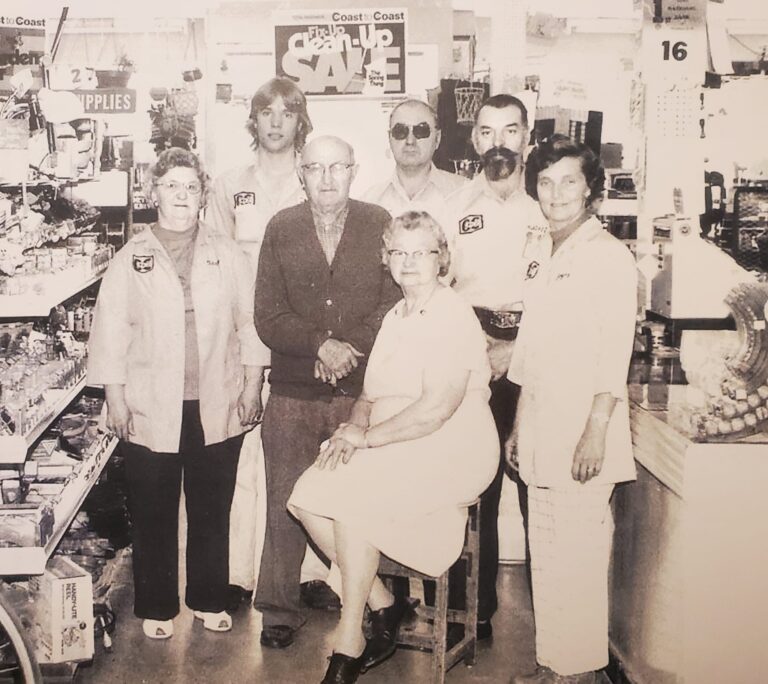
C.J. Koerner Saloon
In the 1890’s John Kleinsasser opened a saloon on Main Street (Lot 16). It was run by John J. Walter from 1902 to 1906. In 1912 Charlie J. Koerner bought the business and operated C.J. Koerner Saloon during the teens. The building burned down in 1922 and the property became part of the Coast to Coast expansion in the 1930’s.
Shack Cafe > City Cafe > Freeman Courier
In 1896 George Gross operated a furniture store on Main Street (Lot 17). In 1915 Andrew Waldner started a cafe on Main Street which burned down in 1922. In 1923 he rebuilt the cafe and named it the Shack Cafe. In 1942 Tom Kaufman bought the business and renamed it City Cafe. Tom turned the business over to Ernie Stoebner in 1956. City Cafe was open from 1942 until 1972. In 1972 Dennis Wollman started a pharmacy in the building called Wollman Drug which operated until 1979. In 1994 Freeman Courier moved into the building.
April 11, 1901 the first Freeman Courier was printed by Osborn and Williams. They printed until 1902 when J.J. Mendel took over the paper. The Freeman Courier was located above the Schamber store. In 1928 Mendel moved the Courier to Third Street (now Hootz Bar) where it operated for 32 years. In 1960 Glenn and Vernon Gering took over the Courier and moved the business to Pine Hill Printery on Sixth Street. In 1968 the Courier joined 9 other newspaper publishers and formed the Dakota Action Rocket. Tim Waltner worked for Glenn Gering as editor in the late 1970’s and took over of the Freeman Courier in 1984.
Freeman Mercantile
In 1889 Peter Goertz, John Tschetter, and George “Graysold” Gross opened a general merchandise business the corner of Third and Main Street (Lot 18). In 1896 George Gross bought the property to the south for a furniture store as well. In 1907 John J Kleinsasser purchased the general store and started Freeman Mercantile Co. John sold caskets and conducted funerals in the back of the store from around 1910 to 1922. In 1922 the buildings were destroyed in a fire. In 1925 John J. Kleinsasser started a service station on the corner (Standard Oil). John’s son Kurt ran the service station and sold it to Alvin Huber in 1935. Alvin turned it into an automotive business and moved a block south in 1944.

